“ For in fact, if man had never been corrupt, he would enjoy in his innocence both truth and happiness with assurance; and if man had always been corrupt, he would have no idea of truth or bliss. But, wretched as we are, and more so than if there were no greatness in our condition, we have an idea of happiness, and cannot reach it. We perceive an image of truth, and possess only a lie. ”
Blaise Pascal, Pensées (1670). copy citation
| Author | Blaise Pascal |
|---|---|
| Source | Pensées |
| Topic | greatness innocence |
| Date | 1670 |
| Language | English |
| Reference | |
| Note | Translated by W. F. Trotter |
| Weblink | http://www.gutenberg.org/files/18269/18269-h/18269-h.htm |
Context
“Know then, proud man, what a paradox you are to yourself. Humble yourself, weak reason; be silent, foolish nature; learn that man infinitely transcends man, and learn from your Master your true condition, of which you are ignorant. Hear God.
For in fact, if man had never been corrupt, he would enjoy in his innocence both truth and happiness with assurance; and if man had always been corrupt, he would have no idea of truth or bliss. But, wretched as we are, and more so than if there were no greatness in our condition, we have an idea of happiness, and cannot reach it. We perceive an image of truth, and possess only a lie. Incapable of absolute ignorance and of certain knowledge, we have thus been manifestly in a degree of perfection from which we have unhappily fallen.
It is, however, an astonishing thing that the mystery furthest removed from our knowledge, namely, that of the transmission of sin, should be a fact without which we can have no knowledge of ourselves.”
source



